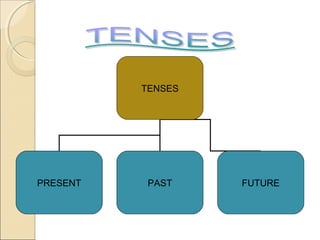
Tenses
- 2. PRESENT TENSEPRESENT TENSE An action which is going at present It is used to tell Universal truth & scientific principles It is used to mention regular and repeated actions It is also used in imperative sentences It has four types
- 3. TYPES OF PRESENTTENSETYPES OF PRESENTTENSE It has four types .They are: Simple Present Present Continuous Present Perfect Present Perfect Continuous
- 4. Simple PresentSimple Present Format : subject + verb + object . Key word: Usually ,Regularly, Often, today . In Third person singular use verb + s Example: 1.He writes a letter 2.My father reads newspaper everyday
- 5. Present ContinuousPresent Continuous Format : subject + be +verb + ing +Object . Keyword : Now, at present . Some verbs cannot be used are: smell, love, prefer, need . Example: 1.He is speaking for his family 2. He is writing a letter .
- 6. Present PerfectPresent Perfect Format : Have/Has + Past Participle + Object . Key word : Just now, Already, So for . It doesn’t used in passive voice Example :1. The function has finished just now. 2.I have finished my work already.
- 7. Present Perfect ContinuousPresent Perfect Continuous Format : Subject + Has/Have been + verb + ing . Key word : Since, For . It doesn’t used in passive voice. Example :1. We have been living at Tanjore since 1990 .2.I have been studying for 15 years.
- 8. Types Of Past TenseTypes Of Past Tense It has four types . There are Simple Past . Past Continuous . Past Perfect . Past Perfect Continuous .
- 9. Simple PastSimple Past Format : Subject + Verb2 +Object . Key word : Yesterday, Once, Last …, Before , Long Long ago . We use this tense for story telling . Example : 1.I went to market yesterday . 2. I joined this college last month .
- 10. Past ContinuousPast Continuous Format : Subject + Was/ Were + Verb + ing . Key word : While , When . Use “ WAS ” in singular person . Use “ Were ” in plural person . Use this tense when subordinate clause starts with “When” and “While”. Example :1. I was talking to my mother when the relatives came .
- 11. Past PerfectPast Perfect Format : Subject + had + Past Participle . Key word : After, Before, Till, As soon as . It denotes the first action in the “past perfect” and the second action in the “past” by connect with “After” . It also have no passive voice . Example :After I had finished my work . I went to go home .
- 12. Present Perfect ContinuousPresent Perfect Continuous Format : Subject + Had been + Verb + ing . Key word : Since, For . It doesn’t use in passive voice . Example : 1.She had been singing a song when she was young .
- 13. Types Of Future TenseTypes Of Future Tense Simple Future . Future Continuous . Future Perfect . Future Perfect Continuous .
- 14. Simple Future TenseSimple Future Tense Format : Subject + Will/ Shall + Verb + Object. Key word : Tomorrow, next … We use this tense in conditional clauses . Example : 1. I will finish my work tomorrow . 2.Tomorrow will be a holiday .
- 15. Future ContinuousFuture Continuous Format : Subject + Will/ Shall + Be verb + ing. Key word : By this time . Example :1. I will be watching T.V. by this time next week .2. I will be doing this work tomorrow by this time .
- 16. Future PerfectFuture Perfect Format : Subject +Will/ Shall +have + Past Participle + Object . Key word : By the end of . It doesn’t use in passive voice . Key word : 1.We will have been studied in this college till 2015.
- 17. Future Perfect ContinuousFuture Perfect Continuous Format : Subject +Will/Shall + Have been + Verb +Ing + Object . It doesn’t use in passive voice . Example : 1.I will have been finishing my work next week .